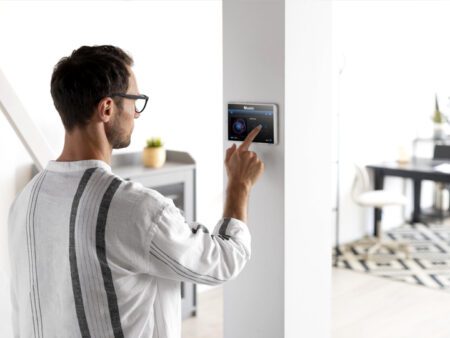 The concept of smart homes once limited to the realm of science fiction, has become an exciting and attainable reality. With the advent of the Internet of Things (IoT), Artificial Intelligence (AI), and advanced automation, our homes are becoming more connected, efficient, and intelligent. But as we look toward the future, what can we expect from the evolution of smart homes?
The concept of smart homes once limited to the realm of science fiction, has become an exciting and attainable reality. With the advent of the Internet of Things (IoT), Artificial Intelligence (AI), and advanced automation, our homes are becoming more connected, efficient, and intelligent. But as we look toward the future, what can we expect from the evolution of smart homes?
The Rise of AI and Machine Learning
Artificial Intelligence (AI) and Machine Learning (ML) are at the forefront of the smart home revolution. These technologies are becoming increasingly sophisticated, enabling our devices to learn from our behaviors and adapt to our needs. For instance, smart thermostats can learn our preferred temperatures at different times of the day and adjust accordingly. In the future, we can expect AI to play an even more integral role in our homes, with devices that can predict our needs before we even realize them ourselves.
Increased Interconnectivity
The future of smart homes lies in increased interconnectivity. Currently, many smart home devices operate independently or require specific apps to control. However, as technology advances, we can expect a more unified smart home ecosystem. This means that all your devices, from your fridge to your lights, will be able to communicate with each other, creating a seamless user experience. Imagine your smart fridge notifying your smart oven to preheat because it knows you usually bake a pizza on Friday nights. This level of interconnectivity will make our homes more efficient and our lives more convenient.
Enhanced Security
Smart home technology has already made significant strides in home security. From smart locks that can be controlled remotely to security cameras that can identify individual faces, our homes are becoming safer. In the future, we can expect even more advanced security features. For example, biometric technology could replace traditional locks, making our homes virtually impervious to break-ins. Additionally, AI could be used to monitor security footage, alerting homeowners and authorities to suspicious activity in real time.
Sustainability and Energy Efficiency
As concerns about climate change and sustainability grow, the future of smart homes will undoubtedly be green. Smart home technology will continue to advance in ways that promote energy efficiency and sustainability. For instance, smart grids could be used to optimize energy consumption, reducing our carbon footprint. Similarly, smart appliances will become more energy-efficient, and renewable energy sources, like solar power, will become more integrated with smart home systems.
Health and Wellness
The COVID-19 pandemic has underscored the importance of health and wellness in our living spaces. In the future, smart homes will likely include more features aimed at promoting health and wellness. For example, smart air purifiers could monitor air quality in real time and adjust settings for optimal air quality. Similarly, smart lighting could adjust based on the time of day to support our circadian rhythms and improve sleep quality.
Privacy Concerns
With the increasing interconnectivity and intelligence of smart homes comes the issue of privacy. As our homes become more connected, the potential for data breaches and privacy violations increases. However, the tech industry is aware of these concerns and is working on solutions. Future smart homes will likely include advanced security features to protect our data and privacy.
Conclusion
The future of smart homes is exciting, with advancements in AI, machine learning, and IoT leading the way toward more interconnected, efficient, and intelligent homes. However, as we embrace this future, it’s crucial to consider the potential challenges, particularly around privacy and security. Nevertheless, the potential benefits – from enhanced convenience and security to improved energy efficiency and health – make the future of smart homes a promising prospect. As we move forward, we can expect our homes to become not just a place to live but a partner in our daily lives, adapting and responding to our needs in real time.
While the future of smart homes is still unfolding, one thing is certain: technology will continue to redefine the way we live. As we look towards this future, we must embrace the opportunities while also addressing the challenges. With careful planning and thoughtful design, we can create smart homes that are not only intelligent and efficient but also secure, sustainable, and conducive to our well-being.
The smart home of the future is more than just a collection of connected devices. It’s a holistic system that integrates various aspects of our lives, from security and convenience to health and sustainability. As we continue to innovate and push the boundaries of what’s possible, we’re not just creating smart homes – we’re shaping the future of living.
In the end, the future of smart homes is not just about technology. It’s about how this technology can enhance our lives, making our homes more comfortable, convenient, and secure. It’s about creating a living environment that understands us, anticipates our needs, and responds in real time. And most importantly, it’s about using technology to create homes that are not just smart but also sustainable, healthy, and respectful of our privacy.
The future of smart homes is bright, and we’re just at the beginning of this exciting journey. As we continue to explore the possibilities, we can look forward to a future where our homes are more than just places to live – they’re partners in our daily lives, helping us live better, healthier, and more sustainable lives.
Picture Credit: Freepik
